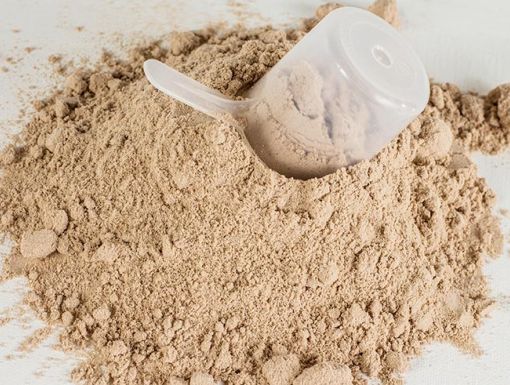
Protein Primer: Incorporating the Right Amount into Your Diet
Proteins play a vital role in our health. They are essential nutrients in the human body that are involved in nearly all cellular and metabolic processes. Proteins keep our bodies functioning smoothly and help us reach physical goals like maintaining a healthy weight and getting leaner or stronger.
But what exactly is protein and how much of it do we need?
What Is Protein and Why Does It Matter?
Protein is a fundamental component for healthy bones, muscles, cartilage, skin and blood. It’s important for enzyme and hormone production and maintaining a healthy blood pressure. Not only does protein help to support and build muscle, it also aids in post-workout muscle recovery by helping to repair muscle fibers that are stressed with exercise.
Protein is digested more slowly than carbs, making us feel fuller longer and reducing cravings. It also requires more energy to break down protein into amino acids, which means our bodies burn more calories digesting protein than they would fat or carbs.
Having the right amount of protein certainly matters, as too little protein in the diet can leave us feeling tired and hungry. Over time a lack of protein can weaken our immune system and lead to sarcopenia (the gradual loss of muscle mass that occurs naturally as we age).
Protein in Diet: How Much Do We Need?
Many people may not be getting enough protein. In fact, the recommended daily allowance (RDA) for protein is too low for most people. RDAs are recommended daily intakes of a nutrient for healthy people and provide a guide for how much of that nutrient you should get on average each day. However, set at 46 grams and 56 grams of daily protein for women and men respectively, this calculates to 0.36 grams of protein per pound of body weight – an amount that is too low for most people.
So, how much do we really need?
Research shows that most of us should aim for 0.45 to 0.68 grams of protein per pound. To streamline, round up to 0.5 to 0.75 grams (or even simply 1 gram) of protein per pound of body weight. For example, an average 150-pound person would aim for 75-150 grams of protein daily. However, those looking to gain weight may need more.
Incorporating protein into meals and snacks throughout the day (instead of trying to fit it all in at once) makes it easier to reach your daily protein goal. I typically recommend 4 to 6 ounces (roughly 25 to 40 grams) of lean protein or protein-rich vegetarian alternatives at lunch and dinner and the equivalent of 2 to 3 ounces of lean protein (about 15 to 20 grams) for breakfast and snacks.
Best Sources of Protein (for both Meat-Eaters and Vegetarians)
After understanding the appropriate amount of protein intake for your nutritional needs, the next step is understanding where to get this protein. The best method is to focus on protein-rich foods like fish and fresh (skinless) poultry.
Vegetarians can reach for options like red beans, eggs and Greek yogurt. Even with these meatless options, it is still feasible to meet daily goals. For example, three ounces of grilled steak has 21 grams of protein. This is just slightly more protein than one cup of lentils and less than the 24 grams of protein you’ll get in a cup of cottage cheese or plain Greek yogurt.
Here is a summary of what 100 calories worth of popular protein-rich foods look like and just how much protein you’ll get for those calories. We’ve listed them from greatest to least in terms of protein content per 100 calories:
- Egg Whites (3 ounces) – 25 grams protein
- Collagen powder (2.5 scoops) – 25 grams protein
- Shrimp (3.5 ounces) – 22 grams protein
- Snapper or drum (3 ounces) – 21 grams protein
- Protein powder (1 scoop Designer Whey Natural Vanilla) – 20 grams protein
- Greek yogurt, nonfat plain (6 ounces) – 17.5 grams protein
- Chicken breast, skinless (2ounces) – 17 grams protein
- 95 percent lean ground beef (2 ounces) – 15 grams protein
- Sirloin (2 ounces) – 15 grams protein
- Salmon (2 ounces) – 14.5 grams protein
- Cottage cheese, nonfat (5 ounces) – 14.5 grams protein
- Mozzarella cheese, part skim (1.5 ounces) – 10.5 grams protein
- Eggs (1.5 large eggs) – 9 grams protein
- Red beans (1/2 cup, cooked) – 7.5 grams protein
- Banza chickpea pasta (1/2 cup, cooked) – 7 grams protein
- Milk, 2 percent fat (3/4 cup) – 6 grams protein
- Flavored yogurt, e.g. Yoplait Original (4 ounces) – 4 grams protein
- Quinoa (1/2 cup, cooked) – 4 grams protein
- Peanut butter or almond butter (1 tablespoon) – 3.5 grams protein
- Almonds (14 whole almonds) – 3.5 grams protein
As you can see, it doesn’t take long for the protein grams to add up. A great tip is to keep a food log on a smartphone app or with pen and paper to help track your protein intake. Make sure to note how you feel as you ramp up your protein intake. If you’ve been under eating protein, you may be surprised at the results!
Of course, protein intake can vary by lifestyle depending on activity level or other dietary requirements. If you are ever concerned or have questions about your nutritional needs, reach out to a provider at the Ochsner Division of Nutrition and Weight Management or contact a primary care physician.
A version of this article originally appeared on Nola.com. See the full article here.
Note: Registered dietician Molly Kimball offers brand-name products as a consumer guide; she, along with Ochsner Health, do not solicit product samples nor are paid to recommend items.



